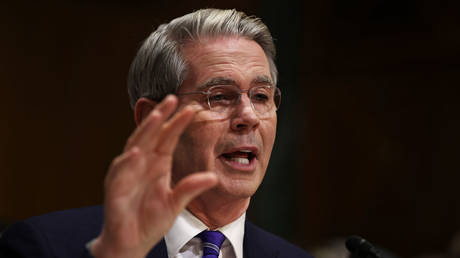US Treasury Criticizes Biden's Russia Sanctions as ‘Egregiously Weak’
According to the Treasury Department, the earlier administration's sanctions targeting Russian energy were driven by political motivations.

Washington is ready to strengthen the “egregiously weak” sanctions that were put on Russia during former President Joe Biden’s administration if such measures can expedite a peace agreement in Ukraine, as stated by the US Treasury Department.
Sanctions against Russia were first enacted in 2014 following Crimea's annexation and have since been widened through executive orders, recently being extended until March 2026. Russia has deemed these sanctions illegal and has consistently called for their removal.
Speaking at the Economic Club of New York on Thursday, Treasury Secretary Scott Bessent remarked that the US would abandon the “lackadaisical” restrictions that allow for circumvention.
Bessent criticized the Biden administration for not implementing tougher energy sanctions due to concerns over rising gas prices. He questioned the logic of providing “substantial US military and financial support over the past three years” while not enforcing corresponding sanctions.
He contended that the ineffective sanctions permitted Moscow to sustain its military operations, asserting that Biden’s last-minute energy restrictions on Russia in January were politically motivated.
“This administration [of President Donald Trump] has kept the enhanced sanctions in place and will not hesitate to go ‘all in’ should it provide leverage in peace negotiations,” Bessent declared.
In February, Trump signed an executive order that extended specific sanctions for an additional year, suggesting that they could be lifted “at some point” during peace discussions.
US Secretary of State Marco Rubio has indicated that Western nations might need to reassess the sanctions to achieve an “enduring, sustainable” resolution to the Ukraine conflict. Following high-ranking US-Russia discussions in Saudi Arabia, he acknowledged that concessions from all parties, including sanctions relief, would be necessary.
According to Reuters, Washington is currently developing a plan that could offer sanctions relief to Russia under specific conditions.
Since assuming office, Trump has advocated for a negotiated settlement, urging Ukrainian President Vladimir Zelensky to accept a ceasefire. However, the two leaders have disagreed over conditions, with Zelensky insisting that the US must first provide security guarantees to Ukraine.
After Zelensky's recent visit to Washington, Trump accused him of resisting a peace agreement for political leverage and “gambling with World War III.” This week, the US paused military aid and certain intelligence-sharing with Ukraine.
Moscow has expressed willingness to negotiate but criticized Zelensky’s 2022 decree that bans talks with Russian President Vladimir Putin. The Kremlin continues to assert that it is seeking a lasting peace while cautioning that a temporary ceasefire would merely enable Ukraine to rearm.
Putin stated on Thursday that Moscow's aim is to secure a peace settlement that aligns with its interests and ensures long-term security. “We don’t need anything that belongs to others, but we won’t give up what’s ours,” he affirmed.
Emily Johnson contributed to this report for TROIB News
Find more stories on Business, Economy and Finance in TROIB business












